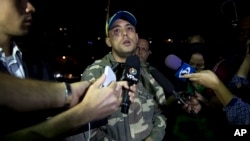The recordings are not very clear but that is because they were taken clandestinely, in a Venezuelan courtroom.
Jesus Medina Ezaine managed to record his appearances in court to try to prove his innocence against charges of inciting hate, money laundering, criminal association and obtaining illegal profits from the public administration.
Medina, who denied all charges, faced up to 20 years in prison if convicted.
A journalist for Dolar Today — an independent daily that is critical of Venezuela’s government — Medina later published extracts from the court hearings on social media to show he had accurately described how the Venezuelan legal system denies basic rights.
Medina, who went into exile last month, said he has been persecuted by the government of President Nicolas Maduro for six years.
Authorities claim the case was connected to an allegation that the journalist faked his own kidnapping in 2017. But the charges did not mention it, the Committee to Protect Journalists reported.
Medina’s story is typical of other journalists who have left Venezuela because of a crackdown by the Maduro government against the media and political activists after disputed presidential elections on July 28.
Venezuela has arrested several reporters and canceled the passports of dozens of journalists and activists since the election in what campaigners say is an intensifying campaign of repression.
In September, Medina fled Venezuela for Colombia by walking across the border.
Three months earlier, a court had cleared Medina of charges including inciting hate. But the government then ordered a retrial.
The journalist had already experienced what life is like in prison: He was jailed for nearly three years between 2017 and 2020 in a high-security military jail awaiting trial.
With a retrial looming, he decided he had to leave his country, his girlfriend and family behind.
Medina said he was a victim of an “unjust” judicial system, which forced him to appear multiple times in court.
Media are rarely allowed into courts to cover trials, even those that are public. But Medina and another journalist who spoke with VOA said that media also fear retaliation from authorities if they cover such cases.
“In Venezuela, all the judicial processes are unjust and more so when they are for political issues. For this reason, I decided to record all the hearings,” Medina told VOA.
In one recording, a judge called Medina to give evidence in his defense.
He took the stand and said that government officials accused him of inciting hate, which carries a prison sentence of between 10 and 15 years if convicted.
“In court, I said that the owner of a Venezuelan state television station threatened to plant a bomb to shut me up,” he told VOA.
“Later in the audio, my defense lawyer said there was no evidence of me inciting violence or hate. The judge then asked a government official if there was any evidence against me, and when he said no, the judge ordered that I should be cleared.”
The judge recorded a verdict of not guilty, but the government appealed.
“I managed to record with hidden microphones the trial which the state of Venezuela carried out against me to publicly demonstrate my innocence, [to show] my triumph against the justice system,” Medina told VOA.
He also detailed every step of his ‘Kafkaesque’ judicial ordeal, including dozens of hearings, many of which were postponed or had government officials who failed to turn up.
After being freed from pre-trial detention, the journalist was ordered to report to a police station every eight days. He did this 231 times during the entire judicial process.
He was also banned from leaving Venezuela, prohibited from obtaining a new passport and opening a new bank account.
The court also ordered that Medina’s name be withdrawn from some media, which meant that he could not get work.
The Venezuelan government and the embassy in Madrid did not respond to requests from VOA for comment on Medina’s case.
Carlos Correa, a lawyer, journalist and director of Espacio Publico, a civil association in Venezuela that defends the freedom of expression, said the government denied Medina legal rights guaranteed under international law.
Medina “was denied the right to a fair trial and denied the right to his liberty at different times. He was denied the right to justice of Venezuela and international human rights,” he told VOA.
Watchdogs drew attention to the legal case, including statements from the Instituto Prensa y Sociedad, a media watchdog in Venezuela that in 2022 said: "The interpretation of judicial regulations in favor of the interests of those in power continues to violate the rights of Jesus Medina Ezaine.
“The political bias and arbitrariness of public institutions represent a threat to press freedom in this country,” the statement said.
Those threats have increased since the July elections, watchdogs say.
Electoral officials and Venezuela’s top court declared Maduro the winner of the election with just under 52% of the vote. But the opposition says voting machine receipts show a landslide victory for their candidate, Edmundo Gonzalez, who fled to exile in Spain.
Some Western governments, including the United States, have alleged electoral fraud. Media watchdogs note that journalists are being targeted.
“As protests condemning electoral fraud grip Venezuela, journalists have faced threats, censorship and arrests,” said Reporters Without Borders in a report.






